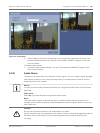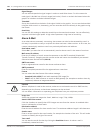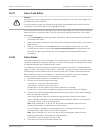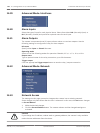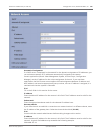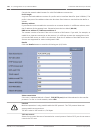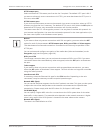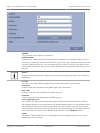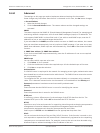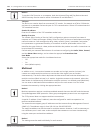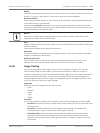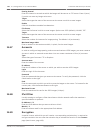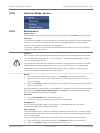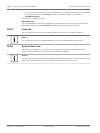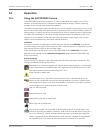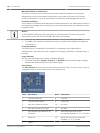
Advanced
The settings on this page are used to implement advanced settings for the network.
Some changes only take effect after the unit is rebooted. In this case, the Set button changes
to Set and Reboot.
1. Make the desired changes.
2. Click the Set and Reboot button. The camera reboots and the changed settings are
activated.
SNMP
The camera supports the SNMP V2 (Simple Network Management Protocol) for managing and
monitoring network components, and can send SNMP messages (traps) to IP addresses. The
unit supports SNMP MIB II in the unified code. If you wish to send SNMP traps, enter the IP
addresses of one or two required target devices here.
If you select On for the SNMP parameter and do not enter an SNMP host address, the camera
does not send them automatically, but only replies to SNMP requests. If you enter one or two
SNMP host addresses, SNMP traps are sent automatically. Select Off to deactivate the SNMP
function.
1. SNMP host address / 2. SNMP host address
If you wish to send SNMP traps automatically, enter the IP addresses of one or two required
target units here.
SNMP traps
You can select which traps are to be sent.
1. Click Select. A list is opened.
2. Click the checkboxes to select the required traps. All the checked traps will be sent.
3. Click Set to accept the selection.
Authentication
If a RADIUS server is employed in the network for managing access rights, authentication must
be activated here to allow communication with the unit. The RADIUS server must also contain
the corresponding data.
To configure the unit, you must connect the camera directly to a computer using a network
cable. This is because communication via the network is not enabled until the Identity and
Password parameters have been set and successfully authenticated.
Identity
Enter the name that the RADIUS server is to use for identifying the camera.
Password
Enter the password that is stored in the RADIUS server.
RTSP port
If necessary, select a different port for the exchange of the RTSP data from the list. The
standard RTSP port is 554. Select Off to deactivate the RTSP function.
NTCIP
Specifies a set of rules and protocols for organizing, describing and exchanging transportation
management information between transportation management applications and
transportation equipment such that they interoperate with each other.
Select a port for NTCIP and the Address from the appropriate drop-down lists.
UPnP
You can activate the Universal Plug and Play (UPnP) function. If the function is turned on, the
unit responds to requests from the network and is automatically registered on the requesting
computers as a new network device. For example, access to the unit can then be made using
Windows Explorer without knowledge of the IP address of the unit.
14.44
AutoDome 7000 Series (IP and HD) Configuration via IP, Advanced Mode | en 133
Bosch Security Systems Operation Manual 2013.07 | 1.2.2 | F.01U.283.679



